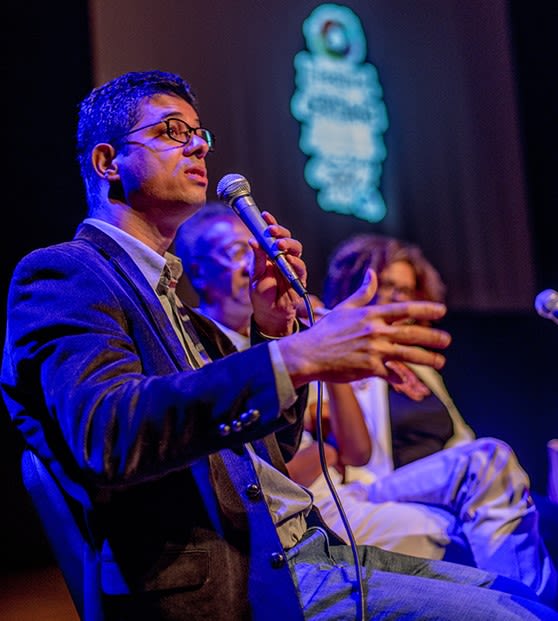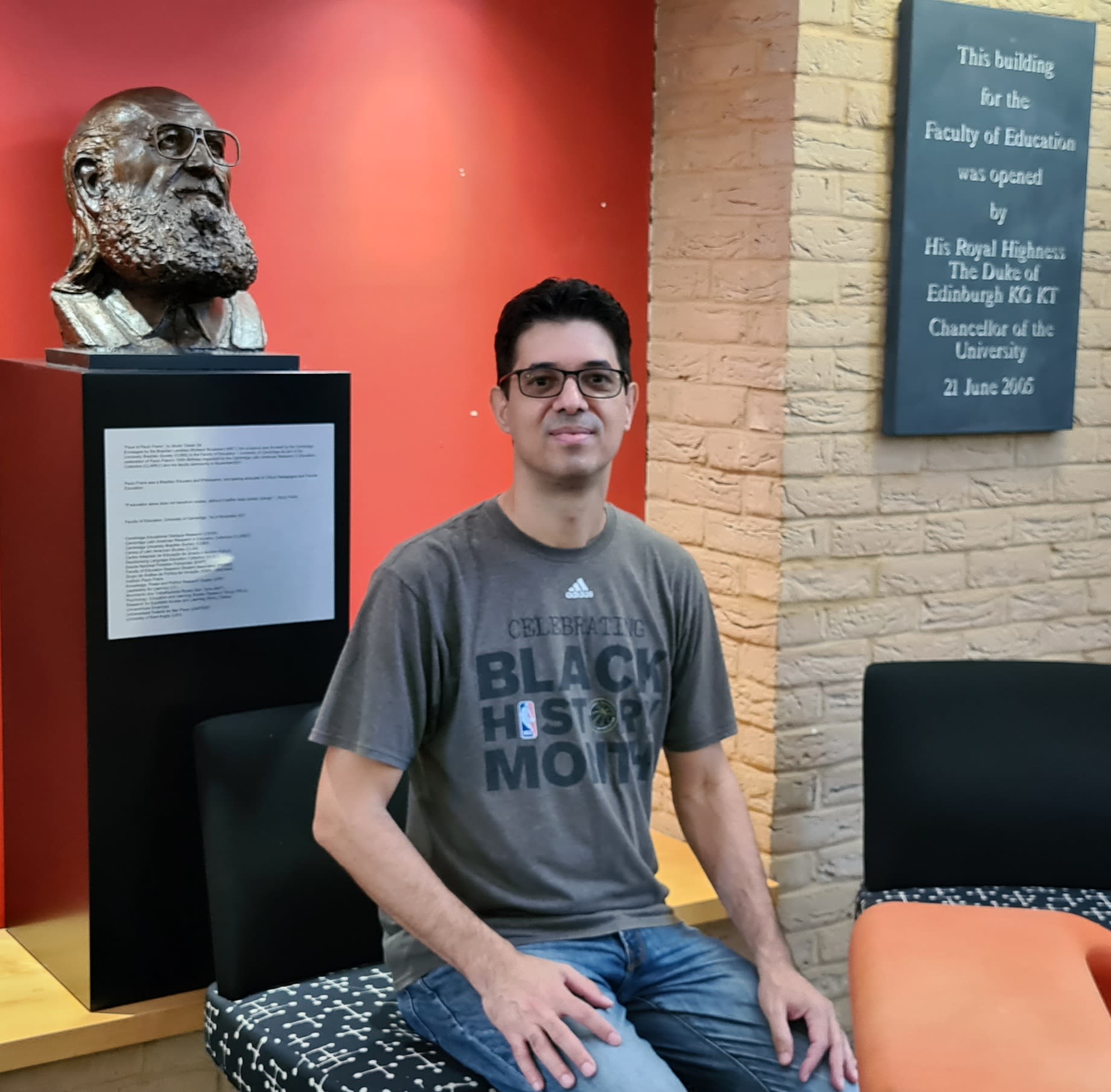

Profile:
Amilcar Pereira

Amilcar Pereira is an Associate Professor of the History of Education at the Faculty of Education, Federal University of Rio de Janeiro (UFRJ), where he specialises in race relations and Afro-Brazilian histories. He is also currently a British Academy Fellow, and last year held a visiting fellowship at the University of Cambridge, as part of an international study that explores anti-racism and education.
The project aims to understand how the black social movement in Brazil and the UK has struggled against racism and begun to change how racism is understood both within the education system and wider society.
It examines the interplay between the work of this movement and developing attitudes towards race and racism at elite universities – including UFRJ and Cambridge. In his work, Amilcar has drawn on archival research on Black activism in the UK, interviews with Black leaders, and interviews with Cambridge students and staff.
Here, he discusses the need to understand the histories of racism and anti-racism from transnational perspectives, the state of anti-racist education now compared with the last 50-60 years, and why he believes that students are at the heart of the drive to ensure that universities adapt to wider societal change.
The UK and Brazil both have histories marked by colonialism and racism. We can look at both their stories and ask how the struggle against racism emerged.
I am especially interested in how this wider history has contributed to anti-racist education, in institutions like Cambridge, and like my own. I see it as a dialogue, rather than a comparison. Of course, Brazil’s story is very different; it was colonised by Portugal before becoming independent in the 19th century. Nevertheless, colonialism was the basis on which hierarchies and inequalities developed in both countries, and movements like Black Lives Matter have shown that we are still feeling that legacy in real terms that concern us now.
In my opinion, we cannot look at racism purely through a national lens; its history is global. I am particularly interested in how anti-racist ideas and movements changed universities. Black activist movements in the UK, for example, not only put pressure on the government, but also on institutions like universities, which themselves play a significant part in determining how society sees itself.
Without that anti-racist struggle, nothing would have changed. Cambridge, for example, would still be a white university, full of rich students. Instead, while the process is beginning, it is gradually becoming more diverse, according to the people I have interviewed here.
These movements were not isolated, they were part of an international conversation.
The anti-racist struggle in education today is therefore part of a longer process that emerged over time.
As an historian of the 20th Century, and I am really interested in the Black movements which emerged in different countries during those years.
Part of my research in the UK has taken me to the Black Cultural Archives in Brixton, for example, where there is a huge amount of material about how the Windrush Generation challenged the education system and created pressure and demand for a more multicultural, anti-racist set of approaches to education. That was happening as that generation came of age, in particular during the 1970s and 80s.
Changes in education today should be seen as part of that longer process. The Black movement has emerged over time in different parts of the world; producing knowledge, educating and changing society by putting pressure on institutions, governments and peoples in general. Education is central for Black activists and has been since the 19th Century. The consequence is that you now have initiatives like the Legacies of Enslavement project at Cambridge. These movements were not isolated; they were part of an international conversation. Activists in the UK were engaged with the work of the Black Panthers in the US, for example, or the Rastafarian movement in Jamaica. Throughout the 20th Century there was a circulation of ideas through the Black diaspora which fed an international, anti-racist struggle. The local institutions created by Black people were always in dialogue with what was happening elsewhere: especially the US and South Africa, but many other places as well.
It's surprising to see how little anti-racist history is captured in the records of universities themselves.
One surprising thing that has emerged from my research is that I could not find much in the archives of universities like Cambridge. In Brazil, I feel public discussion about racism is at a more advanced stage: as a society, I think we have paid more attention to the history of racism, and have been trying to come to terms with it.

Amilcar with the bust of Paulo Freire at the Faculty of Education
Amilcar with the bust of Paulo Freire at the Faculty of Education
In the UK, perhaps because of the different nature of that history, our entanglement with racism and slavery has not been as fully acknowledged, and some positive developments in this area are only quite recent.
Perhaps that is why I encountered a shortage of archival materials about this within universities. I expected to find more: for there to be evidence of conversations, strategies, activities, programmes and projects responding to public pressure for institutions to face up to these issues. There really wasn’t much.
This lack of a basis for change, which is a long and hard process, means it is difficult to be sure how far anti-racism is manifesting in the British education system: in the curriculum, the nature of courses offered to students, or in how universities accommodate diverse students and embrace diverse perspectives.
Students arriving at Cambridge today are much more informed about the anti-racist struggle than in the past, and their numbers are increasing.
In many ways, it is students themselves who make change happen
While I was in Cambridge, I interviewed a Black PhD student who told me how her educational formation had been marked by a complete absence of discussion about race relations in the UK. When she first came to Cambridge, she knew every Black student at the university because there were so few of them. Now, some years later, she sees far more Black people – not only British, but international – and she is studying Black feminism. I think she is a good example of how students are the engine of change and progress in this area. Students arriving at Cambridge today are much more informed about the anti-racist struggle than in the past, and their numbers are increasing. Those students are themselves now a force for change.
One obvious change they are making is requesting more diverse books and resources in the curriculum. It’s not just symbolic: it’s because they know that there is a Eurocentric and Anglo-American bias in the way we study different subjects, and we can learn better from more diverse perspectives. The point to register here is that if we have this decolonial perspective in our universities now, it is not because our universities woke up one morning and decided to change. It is because society demanded that they keep up with the change that was taking place around them.
I approach the future as a realist with hope
In the 1970s, an academic like me would not even have been at Cambridge thinking about these issues. It was not even part of the discussion. From my point of view, therefore, things are changing. I wouldn’t say I’m optimistic, but I approach this as a realist with hope. That’s a characterisation that a lot of Brazilian thinkers like Paulo Freire often use: look at reality, but do so with hope. Believe we can do better, change things, and transform the reality we see.
As an historian, you can never see that as a line of progress. Things can change. In Brazil, we know this only too well given the way our politics have shifted dramatically in recent years. But historians can also look back into the past and register certain changes compared with earlier times. In Cambridge, I spoke to professors, students, librarians and militants. Regardless of their wider perspective, they all agree that things are a little bit different compared with the way they used to be. We are far from where we might want to be as a just, fair, equal, democratic society. But these processes of educating societies about race, driven by the Black social movement, have not only produced knowledge, but inspired and created strategies that mean we now have spaces of dialogue that would not have existed 30, 40, 50 years ago. This gives me hope for the future.
Image: Thirdman, via Pexels.